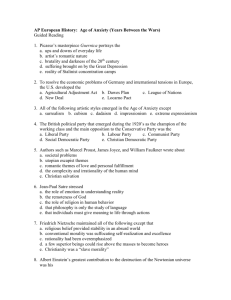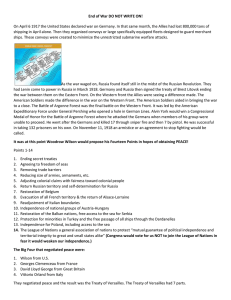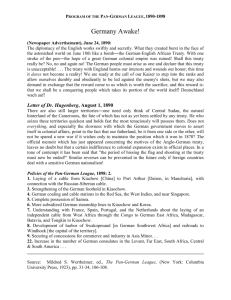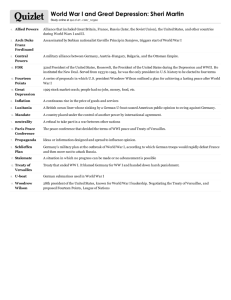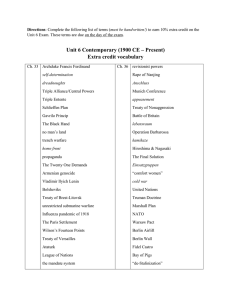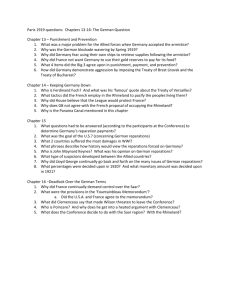(c) crown copyright Catalogue Reference:CAB/23/83 Image Reference:0016
advertisement
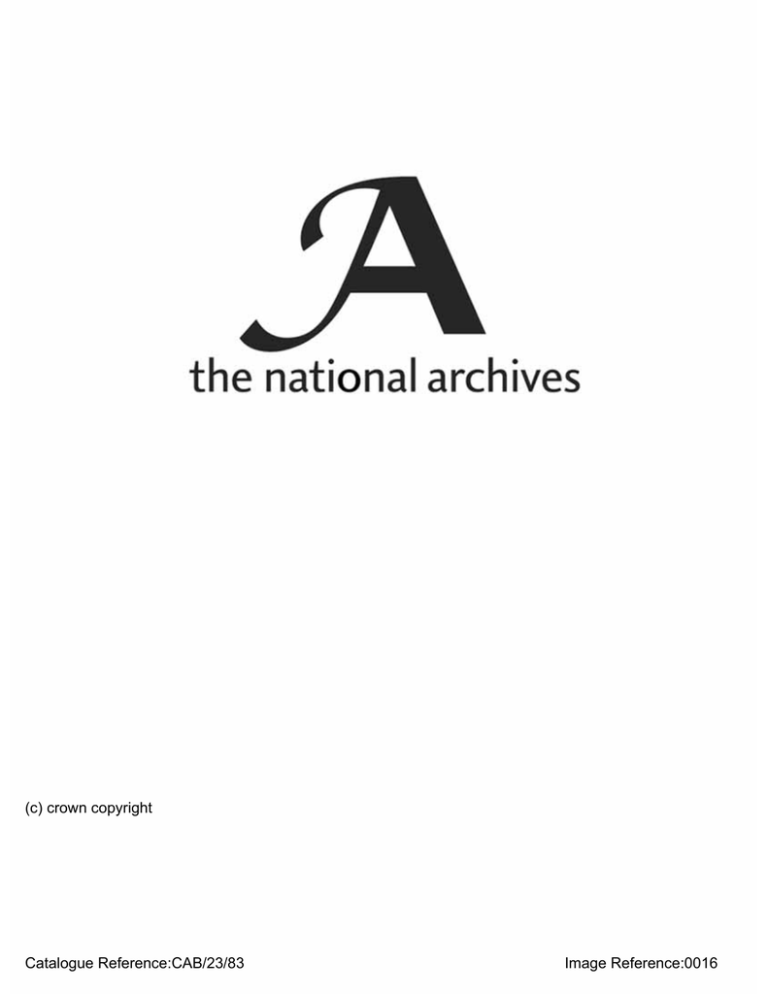
(c) crown copyright Catalogue Reference:CAB/23/83 Image Reference:0016 g jpGUMENT IS THE PROPERTY OF HIS BRITANNIC MAJESTY'S GOVERNMENT), COPY NO. C RET C A B I N E T 16 (56). Meeting of the Cabinet to be held at No. 10, Dawning Street, S.W.I., on MONDAY, 9th MARCH, 1936, at 11.0 a.m. AGENDUM. FOREIGN POLICY. Questions to be raised by the Secretary of State for Foreign Affairs. (Signed) M.P.A. HANKEY, Secretary to the Cabinet. 2, Whitehall Gardens, S.W.I., 6th March, 1936. (THIS DOCUMENT IS THE PROPERTY OF HIS BRITANNIC MAJESTY*S GOVERNMENT). qJ5 C R B T. COPY NO. C A B I N E T 16 (36). CONCLUSIONS of a Meeting of the Cabinet held at 10, Downing Street, S.W.I., on MONDAY, 9th MARCH, 1936, at 11.0 a.m. PRESENT: The Right Hon. Stanley Baldwin, M.P., Prime Minister. (in the Chair), flhe Right Hon. J. Ramsay MacDonald, M.P. , Lord President of the Council. The Right Hon. Neville Chamberlain, M,P., Chancellor of the Exchequer. (The Right Hon. The Viscount Hailsham, Lord Chancellor. The Right Hon. Sir John Simon, G. C. S. I. ,K.CV.O O.B.E., K.C., M.P. , Secretary of State for Home Affairs. frhe Right Hon. Anthony Eden, M.C., M.P., Secretary of State for Foreign Affairs. The Right Hon. The Viscount Halifax, K.G., G.C.S.I. ; G.C I.E. , Lord Privy Seal, The Right Hon. A. Duff Cooper, D.S.O., M.P., Secretary of State for Y/ar. The Right Hon. Malcolm MacDonald, M.P. , Secretary of State for Dominion Affairs. he Right Hon. The Viscount Swinton, G.B.E., M.C., Secretary of State for Air. The Most Hon. The Marquess of Zetland, G.CS.I. , G.CI.E. , Secretary of State for India, he Right Hon. Sir Godfrey Collins, K.B.E., C.M.G. , M.P. , Secretary of State for Scotland. The Right Hon. J.H. Thomas, M.P., Secretary of State for the Colonies. lie Right Hon. Walter Runciman, M.P., President of the Board of Trade. Ifhe Right Hon. Lord Eustace Percy, M.P. , Minister without Portfolio. Jjie Right Hon. Oliver Stanley, M.C., M.P. I I President of the Board of Education. le Right Hon. Ernest Brown, M.C., M.P. , Minister of Labour. The Right Hon. The Viscount Monsell,. G.B.E., First Lord of the Admiralty. The Right Hon. Walter Elliot, M.C., M.P., Minister of Agriculture and Fisheries. The Right Hon. Sir Kingsley Wood, M.P., Minister of Health. The Right Hon. W, Ormsby-Gore, M.P., First Commissioner of Works. GERMANY AND THE LOCARNO TEE TY. - ­ ­ 1. The Cabinet had before them the following documents relating to the situation created by events in Germany on Saturday, March 7th when Herr (Previous Hitler addressed a hastily summoned meeting of the Reference: Cabinet 15 (36) Reichstag and announced the re-occupation of the Conclusion 1 ) . de ilitarised zone,which was in progress at the f-^v, time of his speech: A Memorandum by the Secretary of State for Foreign Affairs ( C P . 75 (36)) commenting on the German Memorandum of March 7th which had been handed to the Secretary of State for Foreign Affairs by the German Ambassador. A Despatch No. 301 of March 7th from Mr. Eden to Sir E. Phipps (Berlin) cover­ ing the translation of the German Memorandum of March 7th (a revised translation was handed round at the outset of the meeting). A Despatch from. Mr. Eden to Sir G. Clark (Paris) of March 7th recording a con­ versation with the French Ambassador on the subject of a possible meeting of the representatives of the Locarno Powers, other than Germany, to be held in Paris on Monday, March 9th. Also various telegrams received by the Foreign Office from Berlin and Paris. . . The Secret'ry of State for Foreign Affairs mentioned that as a result of numerous communications between London and Paris during the previous day he had acceeded to M. Flandin's request that he should attend a preliminary meeting of the Locarno Powers to be held in Paris on the following day, Tuesday, March 10th. On Tuesday evening the representatives of the Locarno Powers would all leave for Geneva where further meeting would be held. He had made clear to M. Flandin that he considered Geneva the proper. place for these conversations. At the outset of the meeting tho Secretary of State for Foreign Affairs handed round a draft of a statement which he proposed to read in the House of Commons the same evening. (Appendix I ) . There was a pause to enable members of the Cabinet to read the draft statement, after which it was discussed paragraph by paragraph. As a result of this discussion the Cabinet agreed: (a) To approve the draft statement subject to the following amendment s: Bage .1,^ para; 1. To introduce a sentence to bring out the fact that an air pact had been initiated more than a year ago during the course of AngloFrench conversations held in London on February 1 - 3 , 1935. Page 5, line 2. For the word "conversation" put "communica­ tion". Penultimate line: for "subject" put "subsequent". Page 6, line 7. The sentence beginning "A preliminary exchange of views" to the end of the paragraph to be redrafted by the Secretary of State for Foreign Affairs in consultation with the Home Secretary in order to bring out that the Council of the League was the proper body to consider the situation and that the meeting to be held in Paris on Tuesday March 10th was an exchange of views of a preliminary character. NOTE: The redraft was as follows: "The French and Belgian Governments,with the full knowledge and agreement of His Majesty s Government, have asked that the Council of the League of Nations may be summoned as soon as possible to consider the situation. I must emnhasise that the Council of the League is the proper Body for this purpose. The Council will, it is understood, meet on Friday next T MS and no decision can, of course, be reached in advance of that meeting) but an exchange of views will take place in Paris tomorrow between the representatives of the Pour Locarno Powers, other than G-ermany, and these conversations will be resumed at Geneva on the following day. His Majesty's Government will be represented at these conversations by the Lord Privy Seal and myself." Page 7, 3rd paragraph, 1st line. For the words "the action of" put "the course taken by". M 3rd line.; After the first word in the line "entered" insert "and in simultaneously acting as if they did not exist". Omit the following words at the bottom of the paragraph "to action of such a character this country must be unalterably opposed". Between the 3rd,and,4th paragraphs insert the following from page 8* "There is, I am thankful to say, no reason to suppose that the present German action implies a threat of hostilities? the German Government speak in their Memorandum of their "unchangeable longing for a real pacification of Europe', and express their willingness to concluding a non-aggression pact with Prance and Belgian". In case there should be any misunderstanding about our position as a signatory of the Locarno Treaty, His Majesty's Government think it necessary to say that, should there take place during the period which will be necessary for the consideration of that new situation to which I have referred, any actual attack upon Prance or Belgium which would constitute a violation of Article 2 of Locarno, His Majesty's Government in the United Kingdom, notwithstanding the German repudiation of the Treaty would regard themselves as in honour bound to come, in the manner provided in the Treaty, to the assistance of the country attacked. Page 7, 4th. paragraph, 1st line.. For "such circumstances" put "existing circumstances". The last two lines, of the pa^e, should read as follows: 9ftl 4 "One of the main foundations of the peace of Western Europe has been cut away, and, if peace is to be secured there is a manifest duty to rebuild". Page 8. Omit the first word on the page "secured". Line 2. For "we must examine" put "His Majesty"S Government will examine". Second paragraph. To be omitted. Third paragraph. (As already mentioned). Transferred to the previous page. The last four lines of the page beginning "since the essence of" to be deleted. Page 9, line 5. put "supports For the word "enlistment" as well as any verbal or consequential alterations which the Secretary of State for Foreign Affairs might deem necessary. NOTE: A copy of the statement as finally approved is attached in Appendix II. (b) To take note and approve of the Prime Minister's invitation to the Lord Privy Seal to accompany the Secretary of State for Foreign Affairs to Paris and Geneva. (c) That the objective at which the Secretary of State for Foreign Affairs and the Lord Privy Seal should aim should be, if possible to bring about a meeting of the Powers concerned to consider the constructive proposals of the German Government. It was recognised that this might be difficult in present circumstanct ECONOMIC PRESSURE ON GERMANY.. 2. The Minister of Agriculture and Fisheries as Chairman of the Advisory Committee on Trade Questions in Time of War reminded the Cabinet of a (previous Reference: Cabinet 11 (34) Conclusion 4). Report (C. I. D.- Paper No. 1175-B) which had been drawn up in June 1935 and which dealt with the possibility of bringing economic pressure to bear on Germany, without there being a state of war. As the French Government was reported in the French press to have under consideration making a proposal at Geneva to apply economic sanctions to Germany he proposed to bring the said report up-*to-date., 2, Whitehall Gardens, S. W. 1., 9th March, 1936* APPENDIX L DRAFT STATEMENT FOR THE HOUSE OF COMMONS­ (For statement as approved see Appendix II.) On March 6th I asked the German Ambassador to come and see me at the Foreign Office and I made to him a proposal which His Majesty's Ambassador in Berlin had made to the German Chancellor on December 13th last, and which I myself had repeated to the Ambassador on February 27th, that the Powers Signatory of the Treaty of Locarno should proceed with the negotiation of an air pact which, as the House knows, has been under consideration for the last year. On this occasion I reminded His Exoellency of the hopes which Herr Hitler himself has expressed for the betterment of international relations in Western Europe, and I told him that it seemed to me that the time had now come when a real effort must be made to translate these hopes into facts, and to attempt to achieve a real improvement in the relations of the United Kingdom, France and Germany. I pointed out to the Ambassador that the air pact touched what was in some respects a point of junction, and a sensitive point of junction, in the relations of the three great Western Powers, and I thought that the conclusion of such a pact might constitute a stabilising element in our relations in the Westo I did not feel that it was really impossible to negotiate suiah a pact even while the situation was complicated by the ItaloAbyssinian war and I asked the Ambassador to communicate with his Government at once - and I added that His Majesty's Government were genuinely anxious to convert to practical results the sentiments so often expressed in speeches. The German Ambassador came to see me on the morning of March 7th and informed me that he had a communication of very great importance to make. . He then handed to me a memorandum of which he read to me a translation.. An English text of this memorandum is now available in the Vote Office 0 I do not therefore propose to give the House a full account of this memorandum but I should like to draw attention to certain salient points in it. The memorandum falls into two parts. In the first part the German Government have developed at considerable length their objections to the Franco-Soviet Pact and the reasons why in their view the intention of the French Government to conclude this Pact has created an entirely new situation and destroyed the political system of the Locarno Treaty. The German Govern­ ment hold that for these reasons the Locarno Treaty has ceased in practice to exist and that Germany consequently regards herself for her part as no longer bound by this no longer valid Treatyo The memorandum then announces that the German Government have restored the full and unrestricted sovereignty of Germany in the demilitarized zone of the Rhineland. The second part of the memorandum contains a series of proposals which are described as being designed to promote the establishment of a system of peaceful security for Europe, These proposals are first, that a demilitarized zone should be created on both sides of the Franco-German and BelgianGerman frontiers; Secondly, that non-aggression pacts for twenty-five years should be concluded between Germany, France and Belgium; and that Great Britain and Italy should guarantee these pacts; Thirdly, that the Netherlands might he invited to join this treaty system. Fourthly, that these security arrangements should he supplemented by an air pactj Fifthly that non-aggression pacts should be concluded between Germany and the States bordering Germany on the East similar to the agreement between Germany and Poland, the exception previously made in regard to Lithuania being conditionally withdrawn? and finally it is stated that Germany is willing to re-enter the League of Nations, now that equality of rights and the restoration of her full sovereignty over the entire German territory has been attained". In this latter connexion, the German Government express the expectation that in the course of a reasonable period the question of colonial equality of rights and of the separation of the League covenant from the Treaty of Versailles may be settled through friendly negotiation.. On receiving this communication from the German Ambassador I told His Excellency that he could not expect me to make any detailed observations on a document of this importance until I had had an opportunity to study it and to consult my colleagues on the situation which it created. At the same time I told His Excellency that there was one observation which I must make at once. I deeply regretted the information which the Ambassador had given me about the action which the German Government was taking in respect of the demilitarized zone. The Ambassador would appreciate that this amounted to the unilaterial repudiation of a Treaty freely negotiated and freely signed. I had a clear recollection of the statement ...... which the Chancellor had made to me at our first meeting in Berlin on the subject of the Treaty of Locarno, when he had drawn a clear distinction between that treaty and the Treaty 1 of Versailles, and emphasised that Germany had freely signed the Treaty of Locarno. I was aware, I said to the Ambassador of the view of the German Government as the effect of the Franco-Soviet Pact on the Locarno Treaty. That view was not, however, shared, by the other signatories, of the Treaty, and if the German Government, despite the opinions of the other signatories, still maintained their own conclusion, then there was the proper arbitration procedure available for their use. I feared that the effect of the unilateral repudiation of this Treaty upon His Majesty's Government and upon British public opinion must inevitably be deplorable. As to the later parts of the Ambassador's communication I said that I would have carefully to consider these, but clearly the declaration in respect of Germany's attitude towards the League was most important. The Ambassador at this point informed me that the German Government s decision in regard to 1 the League was due to the desire of the German Government to meet the views frequently expressed by the Prime Minister and myself when we emphasised that the policy of His Majesty's Government was based upon the League and upon collective security. Germany he said, was willing to share in such a policy, and there were no conditions attached to her return to the League. She wished to return now. While the German Government hoped that at some later date the Covenant would be divorced from the Treaty of Versailles and Germany given some measure of satisfaction in respect of colonies these were not conditions but matters for negotiation subsequent to Germany's return to the League. As to the later parts of the Ambassador's conversation, I said that I would have carefully to consider these, but clearly the declaration in respect of Germany's attitude towards the League was most important. The Ambassador at this point informed me that the German Government's decision in regard to the League was to a large extent due to their desire to meet the views frequently expressed by the Prime Minister and myself when we emphasised that the policy of Plis Majesty' s Government "was based upon the League and upon collective security, Germany, he said, was willing to share in such a policy and there were no conditions attached to her return to the League. Nat ions. She is willing to re-enter the League of While the German Government expected, that in due time the Covenant would be divorced from the Treaty of Versailles and the question of colonial equality of rights settled, these were not conditions but matters for negotiation subject to Germany's return to the League. I do not need to emphasise the importance of the communication from the German Government of which I have given an account. Similar memoranda have been communicated to the other signatories to the Locarno Treaty, namely Prance, Italy and Belgium. But before passing on to observations of a more general nature, it may be well for me to inform the House of the steps which are to be taken in the immediate future. A preliminary exchange of views will take place in Paris tomorrow between the representatives of the other three signatory Powers and myself when the situation created by the German action will be explored. ' These conversations will be resumed at Geneva on the following day. Meanwhile, the Preach and Belgian Governments, with the full knowledge and agreement of His Majesty's Govern­ ment have asked that the Council of the League of Nations may be summoned as soon as possible to consider the situation. Council will it is understood meet on Friday next. The I have now given the Iiouse an account of recent events together with some comments upon them. I have also given the House such details as are in my possession of the procedure to be follov/ed in the immediate future. But honourable Members will no doubt expect to receive some immediate indication of the ideas and intentions with which the representative of His Majesty's Government must approach at Geneva a problem., the development of which is as yet in some important respects obscure. It is clearly desirable to do this for no-one can fail to realise the stabilising force of a clear­ sighted and united British opinion in the affairs of Europe at this juncture. Let us not delude ourselves. The action of the German Government in unilaterally repudiating obligations into vh ich they had freely entered both complicates and aggravates the international situation. The abrogation of the Locarno Treaty and the occupation of the demilitarised zone has profoundly shaken confidence in any engagement into which the Government of Germany may in future enter. There can be no-one in this House or this country who would wish to condone or excuse such a step. It strikes a severe blow at that principle of sanctity of treaties which underlies the whole structure of international relations. To action of such a character this country must be unalterably opposed. It must be obvious to all that in such circumstances the transition from a bad past to a better future will be an arduous and hazardous enterprise. At the same time we are not merely concerned with the past or the present 9 we are concerned also with the future. One of the main foundations of the peace of Western Europe has been cut away s it is our manifest duty to replace it if peace is to be secured. It is in that spirit that we 9 r;' M J J must approach the new proposals of the German Chancellor. \7e must examine them clear-sightedly and objectively,, with a view to finding out to what extent they represent a means by which the'shaken structure of peace can again be strengthened. In conclusion, I would add. This repudiation by Germany of the Treaty of Locarno creates a new situation which will have to be considered by the parties to the Treaty. It is obviously impossible for me at the present moment to say anything further as to the manner in which that situation may be treated. But there Is one point which I desire to make clear without delay-. There is? I am thankful to say., no reason to suppose that the present German action implies a threat of hostilities the German Government speak in their memorandum of their "unchangeable longing for a real pacification of Europe", and express their willingness to conclude a non-aggression pact with Prance and Belgium. But should there take place during the period which will be necessary for the consideration of that new situation to which I have referred? any actual attack upon Prance or Belgium which would constitute a violation of Article 2 of Locarno? His Majesty's Government in the United Kingdom., notwithstanding the German repudiation of the Treaty? would regard themselves as in honour bound to come? in the manner provided in the Treaty? to the assistance of the country attacked. Since the essence, of the Locarno system was mutuality? I add that His Majesty's Government would adopt a corresponding attitude in the event of a Trench or Belgian attack upon Germany in violation of the Treaty. U0 In the anxious circumstances of the present time 9 I feel justified in asking all sections of opinion in this House for their endorsement of the statement which I have made and for their support in the exacting and arduous task which now confronts the combined wisdom and statesmanship of the worido ? r: 7 STATEMENT FOR THE HOUSE OP COMMONS. (As approved "by the Cabinet on 9th March, 1936). Yes, Sir, the answer is a long one, but I feel sure that the House would wish for the fullest possible information. On March 6th I asked the German Ambassador to come and see me at the Foreign Office and I made to him a proposal which His Majesty's Ambassador in Berlin had made to the Gorman Chancellor on December loth last, that the Powers Signatory of the Treaty of Locarno should proceed with the negotiation of an air pact, as the House will recall that such a pact was first suggested during the course of the Anglo-French conversations held in London in February 1935. On this occasion I reminded His Excellency of the hopes which Herr Hitler himself has expressed for the betterment of international relations in Western Europe, and I told him that it seemed to me that the time had. now come' when a real effort must be made to translate these hopes into facts, and to attempt to achieve a real improvement in the relations of the United Kingdom, France and Germany. I pointed out to the Ambassador that the air pact touched wbat was in some respects a point of junction, and a sensitive point of junction, in the relations of the three great Western Powers, and His Majesty s Government considered that the conclusion of such 1 a pact v/oulcl constitute a stabilising element in our relations in the West. I did not feel that it was really impossible to negotiate such a pact even while the situation was complicated by the Italo-Abyssinian war and I asked the Ambassador to communicate with his Government at once in this sense - I added that His Majesty's Government were genuinely anxious to convert into practical results the sentiments so often expressed in speeches. The German Ambassador came to see me on the morning of March 7th and informed me that he had a communication of very great importance to make. He then handed to me a memorandum of which he read a translation. An English text of this memorandum is now available in the Vote Office. I do not therefore propose to give the House a full account of this memorandum but I should like to draw attention to certain salient points in it. The memorandum falls into two parts. In the first . part the German Government have developed at considerable length their objections to the Franco-Soviet Tact and the reasons why in their view the intention of the French Government to conclude this Pact has created an entirely new situation and destroyed the political system of the Locarno Treaty. The German Government hold that for these reasons the Locarno Treaty has ceased in practice to exist and that Germany consequently regards herself for" her part as no longer bound by this no longer valid Treaty. The memorandum then announces that the German Government have restored the full and unrestricted sovereignty of Germany in the demilitarized zone of the Rhineland. The second part of the memorandum contains a series of proposals which are described as being designed to promote the establishment of a system of peaceful security for Europe. These proposals are first, that a demilitarized zone should be created on both sides of the Franco-German and Belgian-German frontiers; secondly, that non-aggression pacts for twenty-five years should he concluded between Germany, France and Belgium; and that Great Britain and Italy should guarantee these pacts; Thirdly, that the Netherlands might be invited to join this treaty systemj Fourthly, that these security arrangements should be supplemented, by an air pact; Fifthly that non-aggression pacts should be concluded between Germany and the States bordering Germany on the East similar to the agreement between Germany and Poland, the exception previously made in regard to Lithuania being conditionally withdrawn; and finally it is stated that Germany is willing to re-enter the League of Nations, now that equality of rights and the restoration of her full sovereignty over the entire German been attained. territory has In this latter connection, the German Government express the expectation that in the course of a reasonable period the question of colonial equality of rights and of the separation of the League covenant from the Treaty of Versailles may be settled through friendly negotiation. On receiving this communication from the German Ambassador I told His Excellency that he could not expect me to make any detailed observations on a document of this importance until I had had an opportunity to study it and to consult my colleagues on the situation which it created. At the same time I told His Excellency that there was one observation which I must make at once. I deeply regretted the information which the Ambassador had given me about the action which the German Government was taking in respect of the demilitarized zone. The Ambassador would appreciate that this amounted to the unilateral repudiation of a Treaty freely nego­ tiated and freely signed. I had a clear recollection of the statement 2S9 which the Chancellor had. made to me at our first meeting in Berlin on the subject of the Treaty of Locarno, when he had drawn a clear distinction between that treaty and the Treaty of Versailles, and emphasised that Germany had freely signed the Treaty of Locarno. I was aware, I said to the Ambassador of the view of the German Government as to the effect of the FrancoSoviet Pact on the Locarno Treaty. That view was not, however, shared by the other signatories of the Treaty, and if the German Government, despite the opinions of the other signatories, still maintained their own conclusion, then, there was the proper arbitration procedure available for their use. I feared that the effect of the unilateral repudiation of this Treaty upon His Majesty's Government and upon British public opinion must inevitably be deplorable. As to the later parts of the Ambassador's communication, I said that His Majesty's Government would have carefully to consider these, but clearly the declaration in respect of Germany's attitude towards the League was most important. The Ambassador at this point informed me that the German Government's decision in regard to the League was to a large extent due to their desire to meet the views frequently expressed by the Prime Minister and myself when we emphasized that the policy of His Majesty's Government was based upon the League and upon collective security. Germany, he said, was willing to share in such a policy and there were no conditions attached to her return to the League. was willing to re-enter the League of Nations. Germany While the German Government expected that in due time the Covenant would be divorced from the Treaty of Versailles and the question of colonial equality of rights settled, these were not conditions but matters for negotiation subsequent to Germany's return to the League. I do not need to emphasise the importance of the communica­ tion from the German Government of which I have given the House an account. Similar memoranda have been communicated to the other signatories of the Locarno Treaty, namely Prance, Italy and Belgium. But before passing on to observations of a more general nature, it may be well for me to inform the House of the steps which are to be taken in the immediate future. The French and Belgian Governments, with the full knowledge and agreement of His Majesty's Government, have asked that the Council of the League of Nations may be possible to consider the situation. summoned as soon as I must emphasise that the Council of the League is the proper body for this purpose. The Council will, it is understood, meet on Friday next and no decisions can of course be reached in advance of that meeting; but an exchange of views will take place in Paris tomorrow between the representatives of the four Locarno Powers, other than Germany, and these conversations will be resumed at Geneva on the following day. His Majesty's Government will be represented at these conversations by the Lord Privy Seal and myself. I have now given the House an account of recent events together with some comments upon them. I have also given the House such details as are in my possession of the procedure to be followed in the immediate future. But honourable Members will no doubt expect to receive some immediate indication of the ideas and intentions with which the representative of His Majesty's Government must approach at Geneva a problem, the development of which is as yet in some important respects obscure. It is clearly desirable to do this for no one can fail to realise the stabilising force of a clear-sighted and united British opinion in the affairs of Europe at this juncture.­ 9fi9 Let us not delude ourselves. The course taken hy the German Government in unilaterally repudiating obligations into which they had freely entered and in simultaneously acting as if they did not exist both complicates and aggravates the inter national situation. The abrogation of the Locarno Treaty and the occupation of the demilitarised zone have profoundly shaken confidence in any engagement into which the Government of Germany may in future enter. There can be no one in this House or this country who would wish to condone or excuse such a step. It strikes a severe blow at that principle of sanctity of treaties which underlies the whole structure of international relations. There is, I am thankful to say, no reason to suppose that the present German action implies a threat of hostilities! the German Government speak in their memorandum of their "unchangeable longing for a real pacification of Europe", and express their willingness to conclude a non-aggression pact with Prance and Belgium. But in case there should be any misunderstanding about our position as a signatory of the Locarno Treaty, His Majesty's Government think it necessary to say that should there take place during the period which will be necessary for the consideration of the new situation which has arisen, any actual attack upon Prance or Belgium which would constitute a violation of Article 2 of Locarno, His Majesty s Government in the United Kingdom, notwith­ s standing the German repudiation of the Treaty, would regard themselves as in honour bound to come, in the manner provided in the Treaty, to the assistance of the country attacked. It must be obvious to all that in existing circumstances the transition from a bad past to a better future will be an arduous and hazardous enterprise. At the same time we are not merely concerned with the past or the present, we are concerned also with the future. One of the main foundations of the peace of Western Europe has been cut away and if peace is to be secured there is a manifest duty to rebuild,. It is in that spirit that we must approach the new proposals of the German Chancelloro His Majesty's Government will examine them clear­ s ightsdly and objectively with a view to finding out to what ? extent they represent a means by which the shaken structure of peace can again be strengthened. In the present grave condition of international affairs,, His Majesty a Government feel that 1 no opportunity must be missed which offers any hope of amelioration^, In the anxious ciroumstances of the present time. I feel justified in asking all sections of opinion in this House for their support in the exacting and arduous task which now confronts the combined wisdom and statesmanship of the world.

